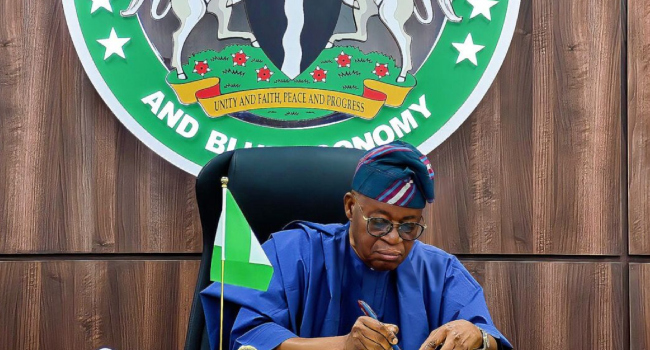The Federal Ministry of Marine and Blue Economy, under the leadership of Honourable Minister Alhaji Gboyega Oyetola, has convened a high-level one-day engagement with citizens and key industry stakeholders to reinforce collaborative efforts toward the successful implementation of Nigeria’s National Policy on Marine and Blue Economy.
The strategic session, held in Abuja, brought together critical actors from across the maritime and logistics value chain, including heads of government agencies, terminal operators, shipping firms, freight forwarders, logistics and transport companies, as well as shippers and other relevant stakeholders. The engagement aimed to create a unified understanding of the policy’s core objectives, while aligning on the steps necessary for its full execution across the sector.
KIIN360 gathered that the event also featured the active participation of the Managing Director of the Nigerian Inland Waterways Authority (NIWA), Dr. Abubakar Dantsoho, who attended alongside the Executive Director of Engineering, Engr. Abba Umar, and the Executive Director of Finance and Administration, Vivian Edet-Richard. Their presence underscored the agency’s commitment to supporting the Ministry’s broader agenda and addressing pressing concerns raised by industry operators.
Discussions at the forum focused extensively on policy interpretation, implementation pillars, and the long-term vision embedded in the Marine and Blue Economy strategy. Stakeholders were given the opportunity to critically assess the policy framework, explore its potential for unlocking economic growth, and contribute practical insights toward refining the roadmap for execution.
Also on the agenda was a comprehensive review of the Ministry’s performance in the first half of 2025, with participants evaluating progress made so far in improving maritime governance, infrastructure, environmental sustainability, and regulatory compliance.
Minister Oyetola, in his remarks, reiterated the Federal Government’s resolve to reposition the marine and blue economy sector as a cornerstone of Nigeria’s economic diversification drive. He noted that effective implementation of the national policy would open vast opportunities in coastal tourism, fisheries, marine transport, and offshore energy, while also creating jobs and promoting environmental conservation.
As the marine sector continues to emerge as a key growth frontier for Nigeria, the Ministry’s latest engagement marks a major step toward building consensus, enhancing transparency, and ensuring that all stakeholders are fully carried along in the transformation agenda.
